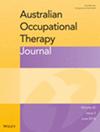“Listen with your ears and eyes and heart and your minds and your soul”: Implications for decolonising consultation and occupational therapy from case studies on “Closing the Gap” policy implementation
Abstract
Background
Including Aboriginal and Torres Strait Islander people and communities through consultation has been a key feature of policy implementation throughout the Australian Government's “Closing the Gap” (CTG) strategy. However, consultation often reinforces power imbalances between government and local community and can undervalue or marginalise Indigenous knowledge and leadership. Occupational therapy has a short history of examining colonial power structures within the profession, but there has been limited progress to decolonise consultation and practice.
Methods
Drawing on decolonising research methodology and positioned at the interface of knowledge, comparative case studies were used to understand policy implementation in two regions. In Shepparton, Victoria, CTG policy was implemented predominately through an Aboriginal Community Controlled Health Organisation, and in Southern Adelaide, South Australia, CTG policy was implemented through mainstream state government and non-government providers in the absence of a local Aboriginal-controlled organisation. Findings were examined critically to identify implications for occupational therapy.
Results
Our case studies showed that policy stakeholders perceived consultation to be tokenistic and partnerships were viewed differently by Aboriginal and non-Indigenous participants. Participants identified the need to move beyond a rhetoric of “working with” Aboriginal and Torres Strait Islander people, to promote Aboriginal leadership and really listen to community so that policy can respond to local need. The findings of this research show that Aboriginal-controlled services are best positioned to conduct and respond to community consultation.
Conclusion
A decolonising approach to consultation would shift the status quo in policy implementation in ways that realign power away from colonial structures towards collaboration with Indigenous leadership and the promotion of Aboriginal-controlled services. There are lessons for occupational therapy from this research on policy implementation on authentic, decolonised consultation as a key feature of policy implementation. Shifting power imbalances through prioritising Indigenous leadership and honouring what is shared can drive change in CTG policy implementation processes and outcomes.

 求助内容:
求助内容: 应助结果提醒方式:
应助结果提醒方式:


